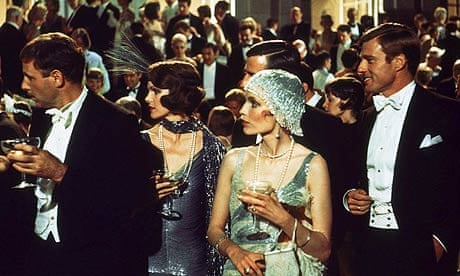What is the most reliably unfilmable novel of the 20th century? Some might argue for Joyce's Ulysses, or Nabokov's Pale Fire; Pynchon's The Crying of Lot 49 or Burroughs' The Naked Lunch (although Cronenberg made a decent fist of that one). Me, I'm tempted to go for The Great Gatsby, if only because it looks so straightforward, so reassuringly high concept when it is actually a fiendish will-o-the-wisp; a deadly honey-trap for all but the shrewdest, most sensitive film-maker.
Baz Luhrmann is the latest director to come circling the snare. And on the face of it he might seem a natural choice. After all, Fitzgerald's jazz age romance plays out in a super-rich landscape of beautiful women, lavish parties and shady high-rollers, which makes it tailor-made for the gaudy, Moulin Rouge! approach. But it is also delicate, introspective and mercurial, which ensures that it's not. This is not to say that Luhrmann should be automatically disqualified from the task. He can be an ambitious and distinctive film-maker when he puts his mind to it, while his cheerful line in irreverence paid brilliant dividends on Romeo + Juliet. Even so, I can't help feeling that this will not end happily.
What is it that makes Gatsby such a difficult book to adapt? Part of the problem, I suppose, is the old tone-and-content conundrum: the task of marrying the author's cool, refined style with his wild, ritzy settings. The most obvious hurdle, however, is Gatsby himself.
The hero of Fitzgerald's 1925 novel is at once the tale's most glamorous, active protagonist and its most shadowy and unknowable cipher – a "series of successful gestures" as opposed to a flesh-and-blood individual. Significantly, Fitzgerald opts to trumpet his presence with a lavish fanfare and then introduces him with barely a murmur. Narrator Nick Carraway describes him as "an elegant young rough-neck, a year or two over 30, whose elaborate formality of speech just missed being absurd" and then leaves us to fill in the blanks. He is at once everywhere and nowhere in the novel.
This, surely, is the problem that has conspired to hobble every film adaptation since the very first attempt, way back in 1926. Certainly it was the issue that got in the way of the well-meaning 1974 version. Yes, Mia Farrow made a surprisingly convincing Daisy. And yes, Bruce Dern was dynamite as Tom Buchanan (read Fitzgerald's description and it could almost have been written with Dern in mind). But Robert Redford playing Jay Gatsby was just that: Robert Redford playing Jay Gatsby. While a talented unknown may have stood a better chance, the Sundance Kid was doomed from the start. If you want to pin down a character that doesn't want to be found, you don't use a movie star. They are just too crude and conspicuous a tool.
These, then, are the pitfalls Luhrmann must navigate as he prepares to travel to West Egg. Maybe he knows all this anyway, and has his solutions already devised. Maybe he would argue that he is making his Gatsby, not Fitzgerald's, which means that these problems can be merrily ignored anyway. And yet – assuming he is not planning to jettison the source material altogether – the Great Gatsby Problem is not going away. Luhrmann needs a Gatsby and he needs him to convince. Hugh Jackman has the appropriate "rough-neck" quality, but is surely wrong for the role. Leonardo DiCaprio has the right air of blessed, youthful optimism but he carries the same baggage that Redford did. Is there anyone out there who is up to the job? Who, pray, would you cast as Gatsby – the most elusive title character since Moby Dick?

Comments (…)
Sign in or create your Guardian account to join the discussion